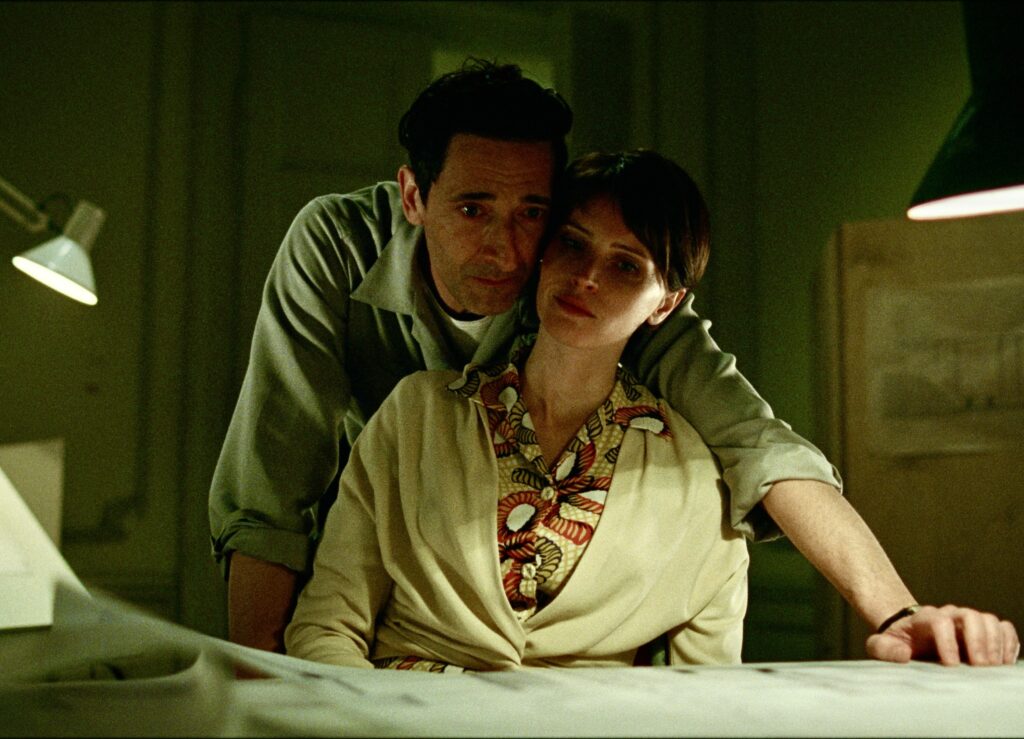
(****)
It only takes a few minutes to ascertain that The Brutalist is a brilliant work of art.
Soon after it begins, this fictional bio/drama exhibits an artistry and craftsmanship usually rendered by French, Italian or Mexican directors. But surprisingly, this auteur is Arizona-born Brady Corbet. An actor (Thirteen) turned director (Vox Lux) whose talent and skills led up to this unique moment, but not in any obvious way.
Shadowed figures move around in the darkness. Hard to distinguish who, what and where. A slight bit of light emerges. A tiny bit of color. It could be a man. Hard to distinguish. There are voices. Murmurs, like animals stirring after hibernation in a cave. There’s movement. Finally, a stream of light. A door is flung open. There’s sunshine. There’s America.
These cryptic, mesmerizing images introduce the weary but hopeful central character László Toth (Adrien Brody, Oscar winner The Pianist). He’s a Jewish Hungarian architect who fled post-WWII Europe in 1947 seeking refuge in the land of the free. Leaving behind his wife Erzsébet (Felicity Jones) and daughter Zsófia (Raffey Cassidy, Vox Lux) until they can reunite. The very symbolic opening scene signifies the darkness of the past, a desperate path forward and a vison of hope.
Everything on view is beautifully lit, composed and filmed (cinematographer Lol Crawley, Vox Lux). Every detail (set decorator Patricia Cuccia), interior (production designer Judy Becker, American Hustle), earth tone hue (Becker and art directors Csenge Jóvári Alexander Linde, Virág Tyekvicska), bit of clothing (costume designer Kate Forbes, Fair Play), sound effect (Steve Single, Andy Neil) and musical note (composer Daniel Blumberg) is impeccably placed. It all gives Corbet the paints and brushes he needs to fill his canvas. To recreate an era and feel from 77 years ago. The parade of beauty peaks in a scene when Toth treks to Carrara Italy and walks among mountain sides of sumptuous marble. Stone so precious, mystical and seductive you can almost hear it calling. Like a siren.
The writer/director, with his co-writer Mona Fastvold, tells a slow building, slowly revealing story many refugees can recognize. A professional in another land becomes a laborer in the U.S., just to make ends meet. Toth is helped by his cousin Attila (Alessandro Nivola) and his wife (Emma Laird). Then he takes menial jobs in Pennsylvania with his new friend Gordon (Isaac De Bankolé). He struggles until a wealthy benefactor (Guy Pearce) gives him a chance to regain his profession and dignity. The architect is hired to create a community center and has chosen to do so in The Brutalist style. An architectural motif that forgoes flamboyance for minimalist construction with an emphasis on materials, texture and function. Often using raw concrete.
Nothing is easy for the central protagonist. The footage shows problems, misery, moments of indiscretion, feelings of joy and a steady angst. It’s a torment many genius artists experience as they create, impose their opinions and wrangle others into helping them fulfill their dreams. There’s a long transition. A long period of growth. A blossoming and withering that’s exhibited for 3h 35m. Audiences shouldn’t be deterred by the epic length. There’s an intermission. Time to collect thoughts and get a second wind.
Toth reconstructs his life, does interior design and builds structures. He’s as temperamental as a three-star chef. In Brody’s hands, the strengths and weakness of the flesh, uncontrollable opium addiction (“It’s for my injury.”), sorrow and happiness feel lived in. He inhabits the mind and troubled soul of László Toth. The accent, strong emotions, despair and bursts of rage feel real. Brody isn’t afraid to bear Toth’s naked truth. His fine performance is not alone.
Pearce, as the rich controlling patron, shows how money can bring the devil out in people. His son, well played by Joe Alwyn (The Favourite), is as deceitful and has the empathy of a stone. De Bankolé gets his character across in few words, strong and silent. While Jones, as Toth’s wife, appears physically weak but has the strongest aura. The main and supporting actors are perfectly cast in a film that could bring them Academy Award nominations. Kristina Erdely, the casting director, should be proud.
This is a rarity. A talented filmmaker flaunts his artistry without overpowering the subject. He respects the storyline, its characters and the process. Some may feel the first half of this fictional story is more alluring than the second, which leads to oblivion. To an ending not as fulfilling as the prologue, first and second acts. Doesn’t matter. What’s on view is still one of the year’s best films, by anyone’s standards. By an emerging director who will be sought after.
Art film fans will pilgrimage to theaters to see The Brutalist. In the first few minutes they’ll recognize exquisite artistry and then bear witness to superlative filmmaking that doesn’t quit.
Photo courtesy of Toronto International Film Festival
For more information about the Toronto International Film Festival go to https://tiff.net/.
Visit Film Critic Dwight Brown at DwightBrownInk.com.